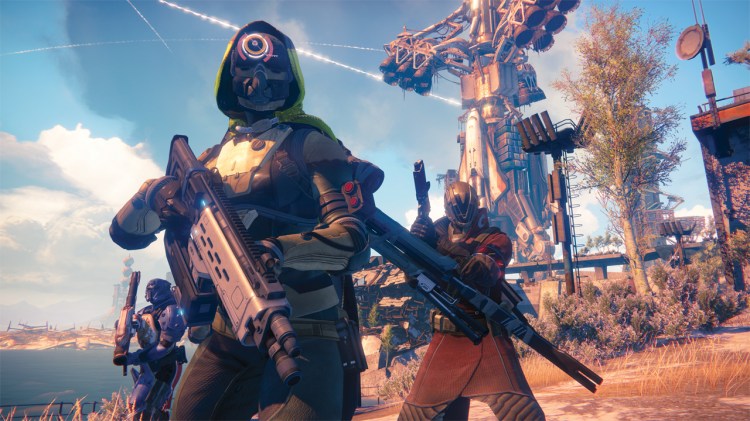A court arbitrator has ruled that Bungie has to return founders’ stock to the fired employee who created the music for Halo and the upcoming Destiny video game series.
The arbitrator (not the Arbiter) said in a preliminary injunction that Bungie erred when it stripped music and audio chief Marty O’Donnell of his founders’ shares in the game studio, which has become extremely valuable because of the success of its Halo, which has generated billions of dollars and sold more than 50 million copies, and the excitement around its upcoming Destiny online shooter game. The litigation between O’Donnell and Bungie offered a rare glimpse inside the high-stakes world of one of the best known game development studios on the planet.
O’Donnell created the memorable musical score for Halo, and he also directed the voice acting for the Halo series. He did the same for Destiny, but after Bungie and O’Donnell parted ways this spring, O’Donnell sued. Bungie hasn’t responded to a request for comment.
For O’Donnell, a great deal was at stake in establishing his ownership of Bungie stock. His music is etched in the minds of countless gamers, and O’Donnell also created the music for the upcoming Destiny game series, which Activision has said it will spend $500 million promoting over the course of a decade. I can’t tell exactly what the stock is worth, as Bungie hasn’t sold a stake in itself or made any filing indicating that value, and it isn’t clear what percentage of Bungie O’Donnell owns.
O’Donnell filed an arbitration claim against Bungie and its chief executive Harold Ryan. The arbitrator, retired Judge Sharon Armstrong at JAMS, Inc. in Seattle, granted O’Donnell’s request for a preliminary injunction restoring his founder’s shares in Bungie. The studio can still appeal, and a final order hasn’t been issued yet.
In a separate but related case, O’Donnell also sued Bungie to recover unpaid wages related to overtime and other compensation. He was awarded $95,000 by the court.
The arbitrator heard oral arguments from both sides on July 16, and then issued the following findings of fact.
The arbitrator found that O’Donnell demonstrated substantial likelihood of proving that he was one of seven founders of Bungie (which originally had the name Arete Seven LLC) and that the company gave him 1.27 million shares of class B shares in October 2007. Those shares were converted into 336,375 shares of Bungie’s Series B-1 Preferred Stock in 2010, when Activision started making a lot of noise about Destiny. He was also issued 48,000 shares of Bungie’s common stock. And in December 2010, O’Donnell signed a contract extending his employment through 2020.
The agreement held that O’Donnell would give up his unvested founders’ shares if he left voluntarily. On April 16, 2010, Bungie and Activision Publishing agreed to make a five-part video game franchise dubbed Destiny. The original release date was set for Sept. 24, 2013. (Destiny is now scheduled for Sept. 9, 2014). O’Donnell composed music for “every application” of the Destiny franchise.
But Bungie terminated O’Donnell without cause on April 11, 2014, according to the complaint. Bungie also took legal action to recover O’Donnell’s shares. “The forfeiture effectively stripped O’Donnell of all rights that he would have enjoyed as a holder of shares, according to the findings of fact by the arbitrator.
On July 1, Bungie stockholders elected to convert their Series B-1 and B-2 preferred stock into common stock. The arbitrator ruled that O’Donnell’s rights as a shareholder should be restored. Bungie lawyers objected that if O’Donnell’s shares were restored, he would be a “bothersome presence at board meetings and in the company,” according to the arbitrator. But the arbitrator overruled them and restored O’Donnell’s rights.
O'Donnell vs Bungie and Ryan – Order and Arbitration Award
VentureBeat's mission is to be a digital town square for technical decision-makers to gain knowledge about transformative enterprise technology and transact. Learn More


